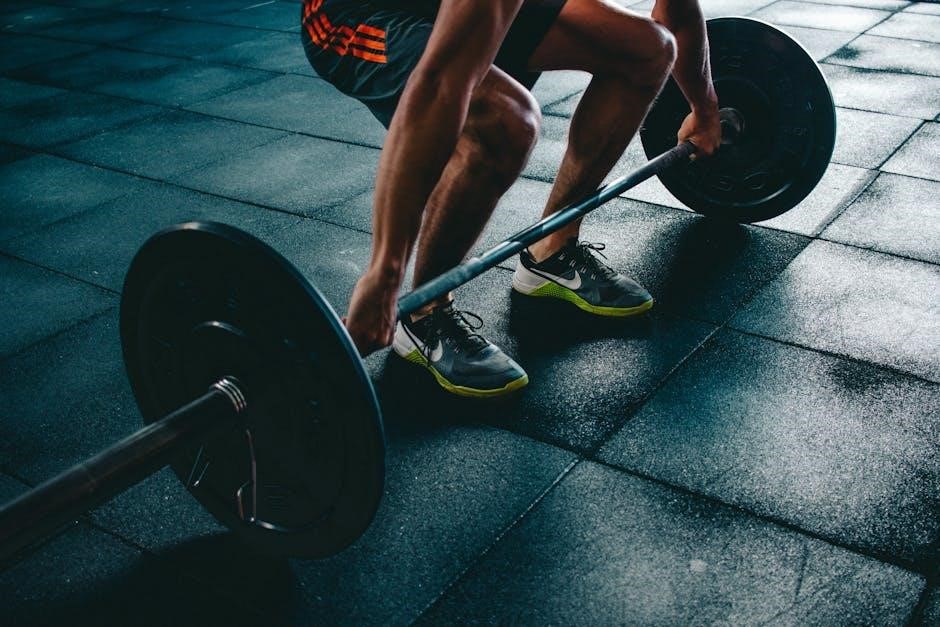Charles Poliquin‚ a legendary strength coach‚ developed training methods that emphasize scientific precision and discipline․ His programs‚ like German Volume Training‚ focus on hypertrophy and leanness through structured routines․
Overview of Poliquin’s Training Principles
Charles Poliquin’s training principles are rooted in scientific research and practical application‚ emphasizing individualized approaches to maximize results․ His methodology incorporates periodization‚ ensuring progressive overload to avoid plateaus‚ and focuses on time under tension to enhance muscle growth․ Poliquin advocates for disciplined routines‚ such as German Volume Training (GVT)‚ which employs high-volume sets to stimulate hypertrophy․ Additionally‚ he stresses the importance of understanding each trainee’s unique needs‚ adapting workouts to suit their goals and biological responses․ His principles also highlight the role of nutrition and supplementation‚ particularly BCAAs‚ to support recovery and muscle development․ By combining structured training with a holistic approach to fitness‚ Poliquin’s methods have become a cornerstone of modern strength and conditioning․

The Role of Discipline and Structure in Poliquin’s Methods
Discipline and structure are cornerstones of Charles Poliquin’s training philosophy․ His programs‚ such as German Volume Training‚ require strict adherence to routines‚ ensuring consistency and maximizing results․ Poliquin emphasizes the importance of maintaining precise rest intervals‚ set volumes‚ and exercise tempos‚ which are crucial for achieving hypertrophy and strength gains․ By eliminating variability and focusing on controlled progression‚ trainees can avoid plateaus and ensure continuous improvement․ This structured approach not only enhances physical performance but also instills mental discipline‚ fostering a resilient mindset․ Poliquin’s methods demonstrate that consistent‚ well-organized training is essential for achieving long-term fitness goals‚ making discipline a non-negotiable component of his system․

The 6-12-25 Protocol: A Key Component of Poliquin’s Workouts
The 6-12-25 protocol‚ developed by Charles Poliquin‚ employs giant sets with minimal rest to achieve maximum muscle development and leanness through high-volume‚ intense training sessions․
Understanding the 6-12-25 Routine for Muscle Development
The 6-12-25 protocol combines strength and hypertrophy training․ It involves performing 6 reps for strength‚ 12 reps for muscle size‚ and 25 reps for endurance‚ targeting critical growth fibers․ This method ensures comprehensive muscle engagement‚ promoting both power and definition․ The high-rep range maximizes time under tension‚ essential for muscle growth․ Minimal rest between sets amplifies metabolic stress‚ enhancing leanness․ The structured approach ensures all muscle fibers are activated‚ making it an effective and intense routine for advanced athletes seeking significant muscle development and definition․
How the Protocol Maximizes Muscle Growth and Leanness
The 6-12-25 protocol maximizes muscle growth and leanness by combining strength‚ hypertrophy‚ and endurance training․ The 6-rep set builds strength‚ while the 12-rep set targets muscle size․ The final 25-rep set increases muscle endurance‚ ensuring all fibers are engaged․ Minimal rest between sets boosts metabolic stress‚ enhancing fat loss and muscle definition․ The high volume and intensity induce significant muscle damage‚ stimulating growth․ This method ensures balanced development‚ making it ideal for athletes seeking both power and aesthetics․ The structured approach optimizes time efficiency‚ delivering results in a short period‚ making it a favorite among advanced trainees aiming for maximal muscle growth and leanness․

German Volume Training (GVT): Poliquin’s Signature Program
German Volume Training is Charles Poliquin’s renowned program designed for rapid muscle growth․ It involves 10 sets of 10 reps per exercise‚ focusing on high volume and intensity to shock muscles into hypertrophy․
Phase 1: The 10×10 Rep Scheme for Hypertrophy
Phase 1 of German Volume Training introduces the 10×10 rep scheme‚ targeting hypertrophy through high volume․ Athletes perform 10 sets of 10 reps for each primary exercise‚ with minimal rest between sets․ This approach maximizes muscle fiber recruitment and metabolic stress‚ key drivers of muscle growth․ The program starts with moderate weights‚ around 60% of 1RM‚ to ensure proper form and adaptation․ Progression is achieved by increasing weight weekly if all reps are completed with consistent rest intervals․ Supersets are often used to enhance efficiency‚ keeping rest periods short to maintain intensity and promote cumulative fatigue‚ which is critical for muscle stimulation and growth․
Phase 2: Adjusting Exercises and Rep Schemes for Continued Growth
Phase 2 of German Volume Training introduces variations in exercises and rep schemes to sustain muscle growth․ Athletes shift to 10 sets of 6 reps for primary exercises‚ reducing volume but increasing intensity․ This phase incorporates different exercises‚ tempos‚ and ranges of motion to target muscles from new angles‚ preventing adaptation․ The structure remains consistent‚ with the same muscle group split and training schedule․ By adjusting variables like exercise selection and rep ranges‚ Phase 2 ensures continued progression and avoids plateaus․ This strategic modification keeps the workouts challenging and promotes further hypertrophy and strength gains‚ building on the foundation established in Phase 1․ The focus remains on precision and consistency to maximize results․

The Importance of Nutrition in Poliquin’s Workout Plans
Nutrition is a cornerstone of Poliquin’s system‚ emphasizing BCAA supplementation and strategic meal planning to optimize muscle recovery and growth‚ ensuring workouts yield maximum results efficiently․

Role of BCAA and Supplementation in Poliquin’s Strategy
Charles Poliquin strongly advocates for BCAA (branched-chain amino acids) supplementation to enhance muscle recovery and growth․ He recommends high doses of leucine‚ isoleucine‚ and valine before workouts to reduce muscle breakdown and promote protein synthesis․ This strategy‚ supported by scientific research‚ helps athletes train more intensely and recover faster․ Poliquin also emphasizes the importance of timing and dosage‚ ensuring that supplementation aligns with training phases to maximize effectiveness․ His approach integrates nutrition and training seamlessly‚ reflecting his belief in a holistic method to achieve optimal physical performance and muscle development․
Meal Planning for Optimal Muscle Recovery and Growth
Charles Poliquin emphasizes the critical role of meal planning in achieving muscle recovery and growth․ His strategies focus on consuming protein-rich foods‚ such as lean meats and fish‚ to support muscle repair and synthesis․ Poliquin advocates for frequent‚ balanced meals throughout the day to maintain metabolic activity and prevent muscle catabolism․ He also stresses the importance of timing nutrition around workouts‚ ensuring adequate carbohydrate and fat intake to fuel performance and recovery․ By avoiding unnecessary calories and focusing on nutrient-dense foods‚ his meal plans are designed to optimize body composition while supporting the intense demands of his training programs․ This structured approach to nutrition complements his workout philosophies‚ ensuring athletes achieve their physical goals efficiently․

Poliquin’s Background and Influence on Modern Training
Charles Poliquin‚ a renowned strength coach‚ began his journey in martial arts‚ earning a black belt at 14․ His transition to weightlifting and innovative training methods revolutionized modern fitness․
From Martial Arts to Weightlifting: Poliquin’s Early Beginnings
Charles Poliquin’s journey into fitness began with martial arts‚ earning a black belt in karate at just 14‚ making him the second-youngest in Canada․ A blizzard led him to weightlifting under his sensei‚ sparking a lifelong passion․ This transition shaped his disciplined approach‚ blending martial arts focus with scientific training principles․ His early experiences laid the foundation for his innovative methods‚ emphasizing adaptability and individualized programs․ Poliquin’s background highlights how diverse influences shaped his revolutionary training philosophy‚ impacting modern strength and conditioning․
Poliquin’s Legacy in Strength and Conditioning
Charles Poliquin left an indelible mark on the world of strength and conditioning‚ earning him the nickname “Strength Sensei․” His scientifically grounded methods‚ such as German Volume Training‚ revolutionized hypertrophy and athletic performance․ Poliquin’s emphasis on individualized training and precise programming influenced countless athletes and coaches․ His legacy endures through his innovative protocols‚ which remain popular in modern fitness․ Poliquin’s work continues to inspire‚ proving his impact on the evolution of strength training and muscle development․ His contributions to the field are timeless‚ ensuring his influence remains central to the world of fitness and sports performance․

